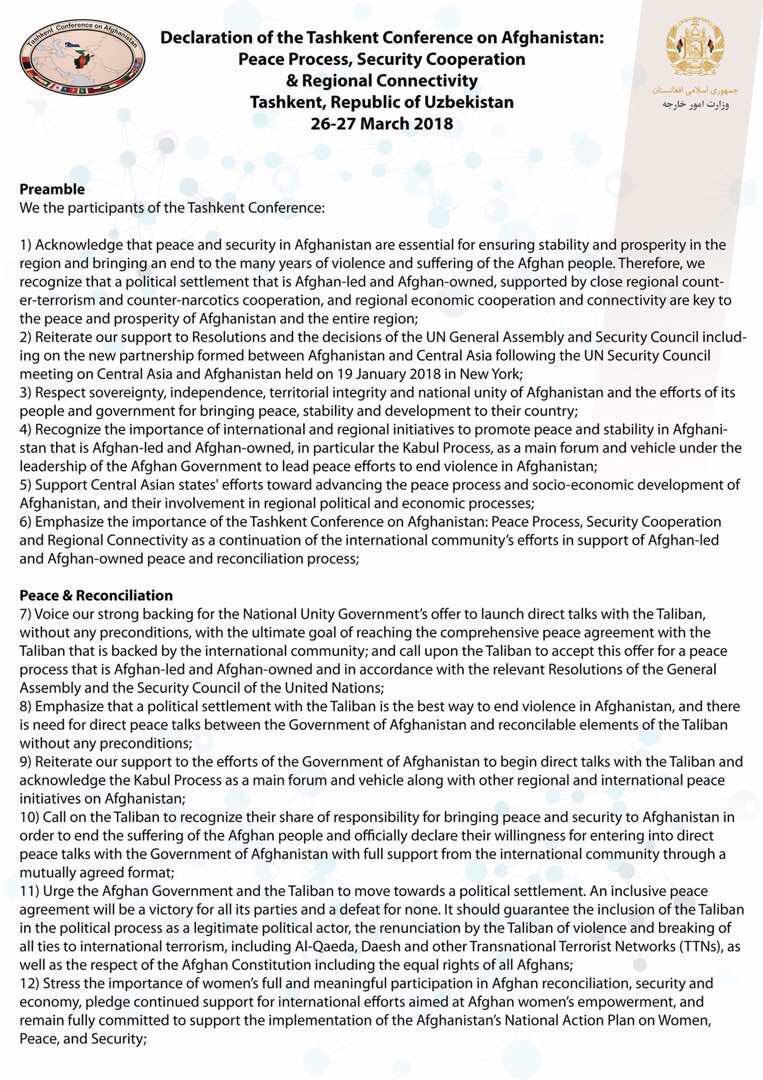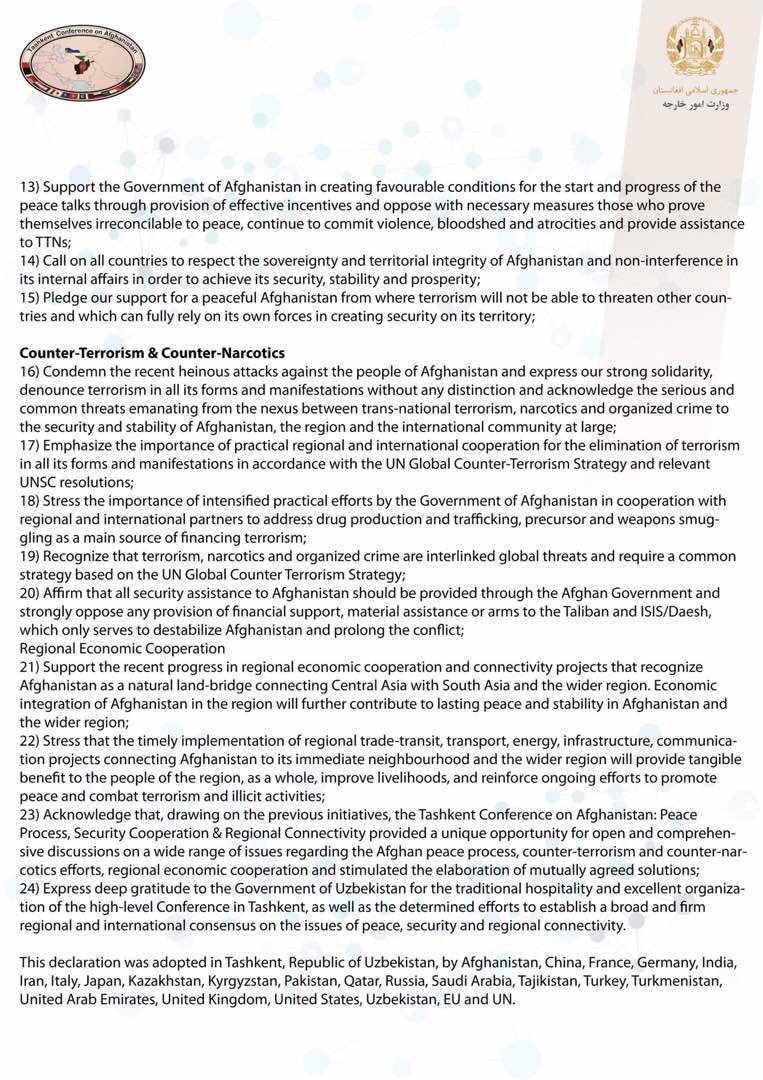Monitoring Desk: Declaration of the Tashkent Conference on Afghanistan which was held on March 26-27 urges Afghan Taliban breaking of all ties to international terrorism, including Al-Qaeda, ISIS/Daesh and other Transnational Terrorist Networks (TTNs).
This clause of Declaration of Tashkent Conference believes that Taliban have ties with international terrorism including ISIS/Daesh.
Clause 11 of Declaration states as:
Urge the Afghan Government and the Taliban to move towards a political settlement. An inclusive peace agreement will be a victory for all its parties and a defeat for none. It should guarantee the inclusion of the Taliban in the political process as a legitimate political actor, the renunciation by the Taliban of violence and breaking of all ties to international terrorism, including Al-Qaeda, ISIS/Daesh and other Transnational Terrorist Networks (TTNs), as well as the respect of the Afghan Constitution including the equal rights of all Afghans;
It is pertinent to mention that Afghan Taliban and Daesh have been fighting against each other to claim areas within Afghanistan and Taliban have officially called war against Daesh.
Other clauses of Declaration of Tashkent Conference on Afghanistan are as follow:
Declaration of the Tashkent conference on Afghanistan: Peace process, security cooperation & regional connectivity
Tashkent, Republic of Uzbekistan
26-27 March 2018
Preamble
We the participants of the Tashkent Conference:
1) Acknowledge that peace and security in Afghanistan are essential for ensuring stability and prosperity in the region and bringing an end to the many years of violence and suffering of the Afghan people. Therefore, we recognize that a political settlement that is Afghan-led and Afghan-owned, supported by close regional counter-terrorism and counter-narcotics cooperation, and regional economic cooperation and connectivity are key to the peace and prosperity of Afghanistan and the entire region;
2) Reiterate our support to Resolutions and the decisions of the UN General Assembly and Security Council including on the new partnership formed between Afghanistan and Central Asia following the UN Security Council meeting on Central Asia and Afghanistan held on 19 January 2018 in New York;
3) Respect sovereignty, independence, territorial integrity and national unity of Afghanistan and the efforts of its people and government for bringing peace, stability and development to their country;
4) Recognize the importance of international and regional initiatives to promote peace and stability in Afghanistan that is Afghan-led and Afghan-owned, in particular the Kabul Process, as a main forum and vehicle under the leadership of the Afghan Government to lead peace efforts to end violence in Afghanistan;
5) Support Central Asian states’ efforts toward advancing the peace process and socio-economic development of Afghanistan, and their involvement in regional political and economic processes;
6) Emphasize the importance of the Tashkent Conference on Afghanistan: Peace Process, Security Cooperation and Regional Connectivity as a continuation of the international community’s efforts in support of Afghan-led and Afghan-owned peace and reconciliation proces;
Peace & Reconciliation
7) Voice our strong backing for the National Unity Government’s offer to launch direct talks with the Taliban, without any preconditions, with the ultimate goal of reaching the comprehensive peace agreement with the Taliban that is backed by the international community; and call upon the Taliban to accept this offer for a peace process that is Afghan-led and Afghan-owned and in accordance with the relevant Resolutions of the General Assembly and the Security Council of the United Nations;
8) Emphasize that a political settlement with the Taliban is the best way to end violence in Afghanistan, and there is need for direct peace talks between the Government of Afghanistan and reconcilable elements of the Taliban without any preconditions;
9) Reiterate our support to the efforts of the Government of Afghanistan to begin direct talks with the Taliban and acknowledge the Kabul Process as a main forum and vehicle along with other regional and international peace initiatives on Afghanistan;
10) Call on the Taliban to recognize their share of responsibility for bringing peace and security to Afghanistan in order to end the suffering of the Afghan people and officially declare their willingness for entering into direct peace talks with the Government of Afghanistan with full support from the international community through a mutually agreed format;
11) Urge the Afghan Government and the Taliban to move towards a political settlement. An inclusive peace agreement will be a victory for all its parties and a defeat for none. It should guarantee the inclusion of the Taliban in the political process as a legitimate political actor, the renunciation by the Taliban of violence and breaking of all ties to international terrorism, including Al-Qaeda, ISIS/Daesh and other Transnational Terrorist Networks (TTNs), as well as the respect of the Afghan Constitution including the equal rights of all Afghans;
12) Stress the importance of women’s full and meaningful participation in Afghan reconciliation, security and economy, pledge continued support for international efforts aimed at Afghan women’s empowerment, and remain fully committed to support the implementation of the Afghanistan’s National Action Plan on Women, Peace, and Security;
13) Support the Government of Afghanistan in creating favourable conditions for the start and progress of the peace talks through provision of effective incentives and oppose with necessary measures those who prove themselves irreconcilable to peace, continue to commit violence, bloodshed and atrocities and provide assistance to TTNs;
14) Call on all countries to respect the sovereignty and territorial integrity of Afghanistan and non-interference in its internal affairs in order to achieve its security, stability and prosperity;
15) Pledge our support for a peaceful Afghanistan from where terrorism will not be able to threaten other countries and which can fully rely on its own forces in creating security on its territory;
Counter-Terrorism & Counter-Narcotics
16) Condemn the recent heinous attacks against the people of Afghanistan and express our strong solidarity, denounce terrorism in all its forms and manifestations without any distinction and acknowledge the serious and common threats emanating from the nexus between trans-national terrorism, narcotics and organized crime to the security and stability of Afghanistan, the region and the international community at large;
17) Emphasize the importance of practical regional and international cooperation for the elimination of terrorism in all its forms and manifestations in accordance with the UN Global Counter-Terrorism Strategy and relevant UNSC resolutions;
18) Stress the importance of intensified practical efforts by the Government of Afghanistan in cooperation with regional and international partners to address drug production and trafficking, precursor and weapons smuggling as a main source of financing terrorism;
19) Recognize that terrorism, narcotics and organized crime are interlinked global threats and require a common strategy based on the UN Global Counter Terrorism Strategy;
20) Affirm that all security assistance to Afghanistan should be provided through the Afghan Government and strongly oppose any provision of financial support, material assistance or arms to the Taliban and ISIS/Daesh, which only serves to destabilize Afghanistan and prolong the conflict;
Regional Economic Cooperation
21) Support the recent progress in regional economic cooperation and connectivity projects that recognize Afghanistan as a natural land-bridge connecting Central Asia with South Asia and the wider region. Economic integration of Afghanistan in the region will further contribute to lasting peace and stability in Afghanistan and the wider region;
22) Stress that the timely implementation of regional trade-transit, transport, energy, infrastructure, communication projects connecting Afghanistan to its immediate neighbourhood and the wider region will provide tangible benefit to the people of the region, as a whole, improve livelihoods, and reinforce ongoing efforts to promote peace and combat terrorism and illicit activities;
23) Acknowledge that, drawing on the previous initiatives, the Tashkent Conference on Afghanistan: Peace Process, Security Cooperation & Regional Connectivity provided a unique opportunity for open and comprehensive discussions on a wide range of issues regarding the Afghan peace process, counter-terrorism and counter-narcotics efforts, regional economic cooperation and stimulated the elaboration of mutually agreed solutions;
24) Express deep gratitude to the Government of Uzbekistan for the traditional hospitality and excellent organization of the high-level Conference in Tashkent, as well as the determined efforts to establish a broad and firm regional and international consensus on the issues of peace, security and regional connectivity.
This declaration was adopted in Tashkent, Republic of Uzbekistan, by Afghanistan, China, France, Germany, India, Iran, Italy, Japan, Kazakhstan, Kyrgyzstan, Pakistan, Qatar, Russia, Saudi Arabia, Tajikistan, Turkey, Turkmenistan, United Arab Emirates, United Kingdom, United States, Uzbekistan, EU and UN.


